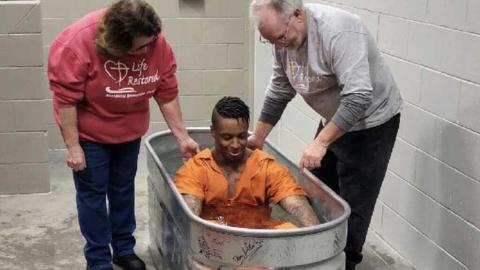Widespread Crime and Chaos Force Democrat-Run Cities to Do a U-Turn on Liberal Crime Polices
Crime and homelessness have made parts of America's major cities unlivable, forcing residents to leave. Cities known for liberal crime policies are backtracking and adopting tougher laws.
When former Portland State philosophy professor Peter Boghossian decided to leave the city he loved, Portland, Oregon, he didn't mince words.
"Portland is like an open sewer. It's a cesspool," Boghossian told the Freedom Pact podcast. "It's like a murder over here, porch pirate over here, car stolen here, a dog mutilated over here. The murder rate is up 300 percent. The homelessness is terrible. Addiction is a huge problem."
That description fits a number of American cities, where residents have moved on due to crime, drugs, tent cities, and trash – cities like Seattle, about which vlogger Chris Jae said, "Within the year and a half or about two years that I was there, I witnessed one individual pull out a knife and start threatening a group of others. I saw the aftermath of one shooting..."
Vlogger Diana Z says she left Los Angeles because, "I kid you not, you guys, there were at least five to seven crimes happening every single day. And these crimes weren't like five miles away, ten miles away. They were all within a mile of where we were living."
After a visit to San Francisco, vlogger Misha Petrov said, "We saw needles on the floor and urine everywhere, smells horrible everywhere. And it's not just like one bad street right, or like one bad area. It's everywhere. And not one cop in sight, like at all. Did you see any cops? None. We didn't see any cops."
As more and more people and businesses flee urban crime and chaos, city leaders have realized they need to do something.
In New York City, the National Guard has been called in to help fight the rampant crime on the city's subways. D.C. just passed a sweeping crime bill that increases penalties for theft and gun crime. San Francisco voters have approved two ballot measures that expand police surveillance and require drug tests for welfare recipients.
Former Prosecutor Cully Stimson at the Heritage Foundation asks why it took them so long.
"What happened to the last three years? Where have those policies been?" Stimson asked. "They could have done this from the beginning. And, you know, we're supposed to forget about the tens of thousands of people who died at the hands of violent criminals, the tens of thousands of businesses that have been robbed, the stores that have closed?"
"We're not going to forget because they happened because of these liberal policies," he said.
**Please sign up for CBN Newsletters and download the CBN News app to ensure you keep receiving the latest news.**
We asked the president of The American Main Street Initiative, Jeff Anderson, why any city leader would think less law enforcement would turn out well.
Anderson laughed and said, "That's a good question. I don't think any sensible person would have thought that. It's not often you see these really atrocious far-left ideas implemented and carried out and then experimented on so quickly. The tent city quality of our cities where people are just living wherever, drug addicts roaming around, rampant crime, it's become kind of a nightmare. We seem to be relearning all the lessons we had to learn in the 1960s and '70s before we got wise on crime again."
READ Progressive Cities Trapped in an 'Urban Doom Loop' of Stunning Consequences
Even the state of Oregon is throwing in the towel on its disastrous drug legalization. When we visited Portland last year, drug counselor Kevin Dahlgren showed us how city and state policies were attracting the drug-addicted homeless from across the country.
Dahlgren said, "The homeless have told me it's very easy to be homeless because we're completely taken care of. We are fed, we are clothed, medical services come right to our tent, people give us anything we want."
Oregon has finally decided that becoming the first state to decriminalize hard drugs was not such a good idea, and is recriminalizing possession of drugs like heroin, cocaine, and fentanyl.
And while some leaders may have seen the light on how to save their cities, Stimson says all the policy changes in the world won't help if district attorneys don't get tough on crime.
"Because the gatekeepers to the criminal justice system are the 2,300 elected District Attorneys around this country. It doesn't matter what the city council passes, or the mayor wags his finger at or the governor bloviates about," Stimson said. "If the D.A. isn't going to carry through with the effective enforcement of the law, chaos ensues."
Most people don't require a lot from their cities, but they do want them to be clean and safe, and that's exactly what a number of large cities can't seem to get right.
ANALYSIS from 2018 Progressive Poop Patrol: Why Liberal San Francisco Is Facing an Excremental Crisis




